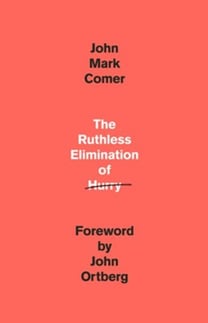In the past two years, I came across a disease that I’d never heard of but almost immediately knew I was suffering from. I looked at the list of symptoms for this disease and quickly diagnosed myself. Behavior characterized by continually rushing and feeling anxious, always feeling short of time, being flustered when encountering (even minor) delays—I most certainly came down with what has risen to become an underlying norm that pervades our culture: hurry sickness.
“Hurry sickness” is a term credited to have been coined by two cardiologists some 40 years ago, but it is a phenomenon that has grown to pandemic proportion in the last two decades. Drs. Meyer Friedman and Ray Rosenman co-authored a book entitled “Type A Behavior and Your Heart.” In their work, they emphasized the traits of a Type A personality and how that behavior is directly linked to heart disease. They noticed that many of their patients suffered from a sense of time urgency, and coined the term “hurry sickness” defined as “a continuous struggle and unremitting attempt to accomplish or achieve more and more things or participate in more and more events in less and less time.”
In more recent years, London Business School professor and researcher Richard Jolly determined that an overwhelming 95 percent of the executives he works with suffer from hurry sickness. The symptoms of hurry sickness include (but are not limited to):
- Irritability
- Hypersensitivity
- Restlessness
- Non-stop activity
- Emotional numbness
- Out of order priorities
- Lack of care for the body
- Escapist behaviors
- Neglect of spiritual practices/disciplines
- Isolation
Perhaps among my gravest concerns with my self-diagnosis is that this is a disease that is quite contagious. It’s not just executives and Type-A personalities that may suffer from it, little to no one—especially in American culture—is immune to contracting hurry sickness. And what is perhaps worse, for those of us raising young humans, it’s a disease easily passed from parents to their children--no matter their age.
For me personally, I’ve noticed that all of my worst moments as a parent take place when I’m in a hurry. Tensions rise, impatience flares up, and lots of “hurry up” commands spill out of my mouth. I tell my young children as we are all trying to get somewhere on time, “Hurry up and get your shoes on…hurry up and get out the door…hurry up, and get buckled.” That is setting a frenetic pace for my littles that they will, in time, internalize, and that could become their own battle with hurry sickness.
For parents of older children, a frenetic pace of life may manifest differently but leave a lasting impact. Adding layers upon layers of activities between school, sports and other extracurriculars, church involvement, and other commitments, most of us would describe our lives as very busy.
Whether we are 14 years old or 40 years old, it is not necessarily our “fault” for suffering from hurry sickness; it’s often something that’s been passed on to us. This way of existing is so prevalent in our culture, so deeply ingrained in us by society, that it feels normal. But this way of life is not how we were designed to operate. Feeling the frantic need to be productive, feeling disconnected from others, ignoring the needs of our bodies and our souls—these symptoms of hurry sickness ultimately result in poor physical, spiritual, emotional, and relational health. If we were to pause long enough to reflect, we could easily agree that this pace of life is not good for our souls, and it is not compatible with having a relationship with God.
This begs the question, what is the cure? How can we stop the generational and cultural cycles of passing on hurry sickness to our own children?
Business and psychology articles on the topic of hurry sickness offer a slew of suggestions for combating the disease. These suggestions sound like “work smarter not harder,” “focus on your key priorities,” and “keep a positive outlook.” While these are all good things, I think they miss a fundamental understanding of how the Creator designed us as human beings.
I believe, and what changes in my own life have revealed to me, is that the cure for hurry sickness is embedded in the fourth of the ten commandments God gave to His people just after He freed them from 400 years of slavery in Egypt. In slavery, God’s people had been forced into a cruel life of labor under an unrelenting ruler. There was no rest, no reprieve, for them in bondage. And as He was delivering them from the unyielding demands of slavery, God spoke to His people about rest:
“Remember the Sabbath day by keeping it holy. Six days you shall labor and do all your work, but the seventh day is a Sabbath to the LORD your God. On it you shall not do any work, neither you, nor your son or daughter, nor your male or female servant, nor your animals, nor any foreigner residing in your towns. For in six days the LORD made the heavens and the earth, the sea, and all that is in them, but he rested on the seventh day. Therefore the LORD blessed the Sabbath day and made it holy.” (Exodus 20:8-11)
For those of us who have grown up in Christian tradition, Sabbath often is interpreted as “go to church on Sundays, and don’t do much/any work.” This was my understanding of Sabbath growing up, but within the last two years, I finally came to a deeper understanding of what Sabbath is.
Sabbath is not another rule to follow, it’s actually a gift from God to us to enjoy.
When we intentionally take a momentary break from all of our hurrying and striving and being productive, this gives us the space we need to just be. As I have moved towards practicing Sabbath rest with my family in the last 18 months, I have seen a dramatic change in my hurry sickness and the overall health of my family. While it is truly a challenge to move towards changing patterns of behavior (like putting the phone down for a set amount of time, resisting the urge to keep doing household chores, etc.), it is so worth receiving this gift from our good Father and enjoying it as He intended.
Recommended Reading
 If you are interested in learning more about practicing Sabbath or combating hurry sickness, I highly recommend John Mark Comer's The Ruthless Elimination of Hurry.
If you are interested in learning more about practicing Sabbath or combating hurry sickness, I highly recommend John Mark Comer's The Ruthless Elimination of Hurry.
/Logos/Horizontal%20Academic%20Logo%20for%20Light%20Backgrounds.png)
/Logos/Horizontal%20Academic%20Logo%20for%20Dark%20Backgrounds.png)

.jpg?width=100&height=100&name=Copy%20of%20Blog%20Authors%20(18).jpg)

